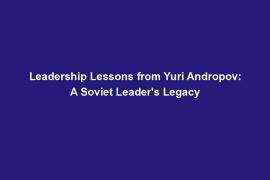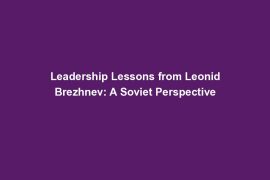Hey there, history buffs! Today, we’re diving into the fascinating world of Soviet leadership with a closer look at Georgy Malenkov. You may have heard his name mentioned in passing, but do you really know who he was and the role he played in shaping Soviet history?
Studying historical leaders like Malenkov isn’t just about delving into the past – it’s about uncovering valuable leadership lessons that we can apply to our own lives today. By examining Malenkov’s actions and decisions, we can gain a deeper understanding of what it takes to lead in complex and ever-changing environments.
So, what can we learn from Malenkov’s leadership style? From his flexibility to his pragmatic approach, we’ll explore how his traits influenced his decision-making process. We’ll also take a closer look at the strengths and weaknesses of his leadership approach, shedding light on the complexities of leadership in high-stakes situations.
But it doesn’t stop there – we’ll also discuss the key lessons that modern leaders can draw from Malenkov’s example. By applying these insights to contemporary leadership challenges, we can navigate our own leadership journeys with wisdom and insight.
So, buckle up and get ready for a deep dive into the world of Soviet leadership with Georgy Malenkov as our guide. By the end of this journey, you’ll come away with a newfound appreciation for the enduring relevance of studying historical leaders for leadership development. Let’s get started!
Georgy Malenkov: A Flexible and Pragmatic Leader
Georgy Malenkov, a key figure in Soviet leadership during the mid-20th century, was known for his flexible and pragmatic leadership style. Let’s delve deeper into how these traits influenced his decision-making process and the strengths and weaknesses of his approach.
Analysis of Leadership Traits
Malenkov’s flexibility allowed him to adapt quickly to changing circumstances, a valuable trait for any leader. Instead of rigidly sticking to a set plan, he was willing to adjust his strategies based on new information or unexpected challenges. This adaptability enabled him to navigate complex political situations with ease.
Additionally, Malenkov’s pragmatism played a crucial role in his leadership style. He was focused on achieving practical outcomes and making decisions that would benefit the Soviet Union in the long run. This practical approach allowed him to prioritize the needs of the country over personal interests or ideological considerations.
Influence on Decision-Making
Malenkov’s leadership style had a significant impact on his decision-making process. By being flexible and pragmatic, he was able to consider various options and choose the one that would best serve the interests of the Soviet Union. This approach helped him steer the country through turbulent times and make tough choices when necessary.
Strengths and Weaknesses
While Malenkov’s flexibility and pragmatism were undoubtedly strengths, they also had their drawbacks. His willingness to adapt could be seen as indecisiveness by some, and his focus on practical outcomes may have led him to overlook important moral or ethical considerations. By examining both the positives and negatives of his leadership style, we can gain a more nuanced understanding of his approach.
Stay tuned for the next section where we explore the key leadership lessons that can be drawn from Georgy Malenkov’s example and how they can be applied to modern leadership challenges.
Lessons for Modern Leaders
Now that we’ve delved into the leadership style of Georgy Malenkov, let’s extract some valuable lessons that can be applied to modern-day leaders facing their own set of challenges.
Identification of Key Leadership Lessons
One of the key lessons we can learn from Malenkov is the importance of flexibility in leadership. Malenkov demonstrated the ability to adapt to changing circumstances, which allowed him to navigate the turbulent political landscape of Soviet Russia.
Additionally, Malenkov’s pragmatism is another trait worth emulating. He was able to make decisions based on practical considerations rather than ideological fervor, leading to more effective outcomes.
Application to Contemporary Leadership Challenges
These lessons can be applied to contemporary leadership challenges in various industries. In today’s fast-paced and ever-changing world, leaders must be flexible and adaptable to stay ahead of the curve. By learning from Malenkov’s example, modern leaders can cultivate these essential traits in themselves.
Moreover, the importance of pragmatism cannot be understated. Making decisions based on practical considerations rather than personal biases or political agendas can lead to more successful outcomes and ultimately benefit the organization as a whole.
Conclusion: Reflection on the Enduring Relevance
Studying historical leaders like Georgy Malenkov provides us with valuable insights that are still relevant today. By examining their successes and failures, we can distill important leadership lessons that can guide us in navigating the complexities of leadership in the modern world.
So, as you reflect on Malenkov’s leadership style and the lessons we’ve drawn from it, think about how you can apply these principles to your own leadership journey. Embrace flexibility, cultivate pragmatism, and always strive to adapt to the ever-changing landscape of leadership. By doing so, you can become a more effective and successful leader in today’s challenging times.



